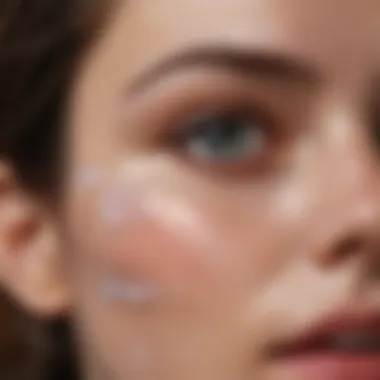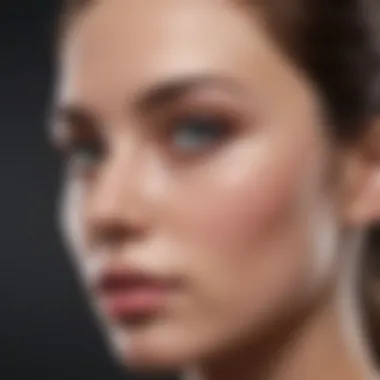Best Moisturizer for Blackheads: Expert Insights


Intro
Managing blackheads can be a challenging aspect of skincare for many women. Blackheads form when hair follicles become clogged with oil, dead skin cells, and bacteria. Unlike whiteheads, they are open at the skin's surface and can appear dark due to oxidation. This guide aims to present essential information about choosing the right moisturizer to help combat blackheads.
Understanding the relationship between moisturizers and blackheads is crucial for developing a successful skincare routine. Not all moisturizers are created equal; some may exacerbate blackhead issues rather than alleviate them. Thus, selecting the right product tailored to individual skin needs is key. Factors such as hydration, skin type, and specific ingredients play a vital role in determining the moisturizer's effectiveness.
In this article, we will explore common misconceptions about skincare, discuss effective practices, and offer product recommendations. The goal is to enable women to make informed choices about their skincare products, specifically those that address blackhead concerns while promoting overall skin health.
Understanding Blackheads
Understanding blackheads is an essential part of any skincare routine, especially for those seeking to manage or eliminate them. Blackheads not only affect the appearance of the skin but can also be an indicator of underlying issues such as excess oil production or clogged pores. By gaining a deeper knowledge of what blackheads are, their causes, and the myths surrounding them, individuals can make informed decisions about their skincare products. This understanding sets the stage for effective appointments, such as choosing the right moisturizers designed specifically to combat blackhead formation.
What Are Blackheads?
Blackheads are a type of acne, which occurs when hair follicles in the skin become clogged with dead skin cells, oil, and bacteria. Unlike whiteheads, which are covered by skin, blackheads remain open to the air. This exposure causes the buildup to oxidize, resulting in their characteristic black color. Blackheads typically appear on areas of the face such as the nose, forehead, and chin, but they can also occur on the back and chest. Although they are not harmful, they can be frustrating and diminish an individual's self-confidence.
Causes of Blackheads
The formation of blackheads can be attributed to multiple factors, including:
- Excess Oil Production: The skin naturally produces oil, or sebum, to keep itself moisturized. However, hormones, particularly androgens, can increase oil production, leading to larger pores and a higher likelihood of clogged follicles.
- Hormonal Changes: Fluctuations during puberty, menstrual cycles, or pregnancy can escalate oil production. These changes can lead to an increase in blackhead occurrences.
- Dead Skin Cells: When skin cells do not shed properly, they can accumulate and contribute to pore blockages.
- Insufficient Cleansing: Inadequate cleaning of the face may leave behind impurities that promote blackhead formation.
Understanding these causes can help in selecting appropriate skincare choices to combat blackheads effectively.
Common Misconceptions
There is considerable misinformation surrounding blackheads, which can affect how individuals approach their skincare regimen. Here are some common myths:
- Myth 1: Blackheads only occur in oily skin types. While oily skin is more susceptible, people with dry or combination skin can also experience blackheads.
- Myth 2: Squeezing blackheads is the best way to remove them. This practice can lead to skin damage, scarring, or even worsen the situation by spreading bacteria.
- Myth 3: Using harsh scrubs will solve the problem. In fact, overly abrasive scrubs can irritate the skin and cause more oil production and inflammation.
Understanding these misconceptions can support individuals in formulating a productive skincare routine that addresses blackhead concerns intelligently.
The Role of Moisturizers in Skincare
Moisturizers play a crucial role in maintaining the overall health and appearance of the skin. They serve as a barrier that locks in moisture, preventing dryness and irritation. For individuals prone to blackheads, the choice of moisturizer becomes particularly significant. Appropriate moisturization can help balance oil production, leading to fewer clogged pores and reduced blackhead formation.
Moreover, when skin lacks moisture, it can overproduce oil, which contributes to various complexion issues, including blackheads. Understanding how to effectively incorporate moisturizers into a skincare routine is essential for anyone looking to maintain clear and healthy skin.


Additionally, the habit of daily moisturizing can enhance the efficacy of other skincare products. When the skin is well-hydrated, active ingredients in serums and treatments are better absorbed, increasing their effectiveness.
Importance of Moisturizing
Moisturizing is not merely a cosmetic step; it is a fundamental practice in skincare. Here are a few key reasons why regular moisturizing is essential:
- Prevents Dryness: Well-hydrated skin maintains its elasticity and softness. Dry skin can exacerbate problems like flaking and irritation, which may contribute to blackheads.
- Balances Oil Production: The right moisturizer balances sebum production. If skin is too dry, it compensates by over-producing oil, leading to clogged pores.
- Supports Skin Repair: Moisturizers often contain ingredients that aid in skin repair and regeneration. This is particularly important for skin affected by blackheads, as addressing existing blemishes helps prevent new ones.
- Protects from Environment: Moisturizers shield the skin from environmental aggressors like pollution and harsh weather. A healthy moisture barrier can reduce sensitivity and improve overall skin resilience.
"Hydrated skin is less prone to issues! Regularly moisturizing can lead to a more balanced and clear complexion."
Choosing Appropriate Moisturizers
Selecting the right moisturizer is crucial for those struggling with blackheads. Here are important considerations:
- Look for Non-Comedogenic Labels: Products labeled as non-comedogenic do not clog pores, making them ideal for those prone to blackheads. Choose moisturizers that specifically mention this benefit.
- Consider Your Skin Type: Different skin types require different formulations. For oily skin, lightweight gel-based moisturizers are often preferable. On the other hand, individuals with dry skin might benefit from cream-based options with richer textures.
- Research Ingredients: Ingredients like hyaluronic acid provide hydration without adding oil. In contrast, thicker formulations may exacerbate blackhead issues. Understanding your skin's unique needs is vital in making the best choice.
- Trial and Error: Sometimes, it takes a few tries to find the perfect match. Keep track of how different products affect your skin and adjust accordingly.
Making informed decisions about moisturizers can significantly impact the clarity and health of your skin.
Key Ingredients for Blackhead-prone Skin
Understanding which key ingredients are effective in skincare can significantly benefit those dealing with blackheads. A well-chosen moisturizer can balance hydration with oil control, making it essential to explore these elements.
Non-comedogenic Formulations
Non-comedogenic formulations are designed to prevent the blocking of pores, which is crucial for those with blackhead concerns. Products labeled as non-comedogenic typically do not contain heavy oils or thick emollients. Instead, they utilize lighter, breathable ingredients that hydrate without adding excess shine. This aspect is essential because when pores become clogged, they lead to the formation of blackheads. Ingredients such as glycerin and hyaluronic acid are often included in these formulations. These help maintain skin moisture while ensuring a breathable feel. Thus, selecting a non-comedogenic moisturizer is vital for controlling blackhead formation.
Hydrating Agents
Hydrating agents in moisturizers serve to maintain skin moisture levels, which can be particularly beneficial for those with oily skin. Ingredients like hyaluronic acid attract water to the skin, helping to keep it plump without adding oil. Similarly, aloe vera is another excellent hydrating agent known for its soothing qualities. It is light yet effective enough to provide hydration without clogging pores. Many people underestimate the importance of hydration in controlling oil production. When skin is adequately hydrated, it may produce less oil, reducing the risk of blackhead formation. Thus, selecting moisturizers with effective hydrating agents is paramount for an effective routine.
Exfoliating Ingredients
Exfoliating ingredients play a critical role in preventing blackheads. They encourage the removal of dead skin cells, which can otherwise accumulate and contribute to clogged pores. Salicylic acid is a standout ingredient in this regard. It penetrates the pores to dissolve dead skin cells and excess sebum. Another commonly used exfoliant is glycolic acid, derived from sugarcane. This alpha hydroxy acid not only helps to shed dead cells but also improves skin texture. Integrating exfoliating ingredients into moisturizers can aid in maintaining a clear complexion. Balancing the use of exfoliants with hydration will make a significant difference in men and women struggling with blackheads.
Key takeaway: Choosing the right key ingredients in skincare products is vital to effectively managing blackheads while ensuring skin remains healthy.
Top Moisturizers for Blackhead Control


In addressing blackheads, the choice of moisturizer plays a crucial role. Many individuals believe that moisturizing can worsen their skin issues, but the right products can actually help control blackheads by balancing oil production and providing necessary hydration. An effective moisturizer can enhance overall skin texture while ensuring that pores remain unclogged.
Moreover, moisturizers designed for blackhead control often contain specific ingredients that target excess oil and dead skin cells, which are the primary contributors to the formation of blackheads. When selecting a moisturizer, consider factors such as the skin type, the porosity of the product, and its active ingredients.
Moisturizers with Salicylic Acid
Salicylic acid is well-regarded for its properties in treating acne and blackheads. This beta hydroxy acid can penetrate the pores and dissolve excess oil, making it an effective ingredient for blackhead control. Using a moisturizer with salicylic acid not only hydrates the skin but also aids in preventing new blackheads from forming.
Many brands have incorporated this key ingredient into their formulations. When using these products, it is important to note your skin’s reaction. Some may experience irritation, especially those with sensitive skin. Hence, it’s best to start with a lower concentration.
Gel-based Moisturizers
Gel-based moisturizers present a light and refreshing option for those concerned about blackheads. They are usually oil-free and absorb quickly into the skin, making them ideal for individuals with oily or combination skin types.
These moisturizers often contain hydrating components, such as hyaluronic acid, alongside non-comedogenic ingredients that do not clog pores. Gel-based products offer hydration without the heaviness associated with creamier options. This is particularly beneficial in warm climates or during the warmer months.
Oil-free Moisturizers
For individuals with oily skin, oil-free moisturizers are essential. These products are formulated without oils and often contain ingredients that help control shine. It's crucial for those with blackhead-prone skin to avoid any products that could lead to excessive oiliness, which can worsen existing blackheads.
Look for oil-free moisturizers with a combination of hydrating agents and exfoliating properties. These moisturizers can provide hydration while maintaining the skin's balance. An oil-free formula can significantly reduce the likelihood of clogged pores and contribute to a clearer complexion.
Additional Skincare Routine Tips
Maintaining a consistent skincare routine is essential when addressing blackheads. While selecting the right moisturizer is crucial, it should be part of a broader approach. This section will highlight three key areas: daily cleansing practices, the importance of regular exfoliation, and sun protection measures, each playing a vital role in reducing blackhead formation and promoting healthier skin overall.
Daily Cleansing Practices
Cleansing is the foundation of any skincare routine. It removes dirt, excess oil, and impurities that contribute to clogged pores and blackheads. Selecting a gentle cleanser, preferably one tailored for oily or combination skin, is important. Look for ingredients like foaming agents or salicylic acid, which can help penetrate the pores.
- Brush Cleansing: Use a gentle facial brush once a week to aid cleansing. This can help to dislodge stubborn oil buildup without being harsh on the skin.
- Frequency: Cleanse your face twice a day, ideally in the morning and at night. This practice not only aids in maintaining skin clarity but is also a proactive measure against blackhead accumulation.
- Technique: Employ circular motions while cleansing to ensure thoroughness. Avoid scrubbing too hard, as this can irritate the skin and promote further oil production.
Regular Exfoliation Importance
Incorporating exfoliation into your routine is an effective method to prevent blackheads. Exfoliation removes dead skin cells that can accumulate and obstruct pores, fostering an environment for blackheads to thrive. However, it is essential to find a balance; over-exfoliating can severely irritate the skin.
- Frequency: A good rule of thumb is to exfoliate two to three times a week. This is enough to keep the skin clear while avoiding irritation.
- Types of Exfoliants: Consider using chemical exfoliants that contain AHAs like glycolic acid or BHAs such as salicylic acid. These not only smooth the skin but also penetrate the pores to keep them clear.
- Gentle Products: Always choose products specifically formulated for your skin type. This ensures that the exfoliant is neither too mild nor too aggressive, providing the right balance.


Sun Protection Measures
Sun protection is often overlooked but remains critical in a skincare routine. Exposure to UV rays can lead to skin damage and increased oil production, exacerbating blackhead issues. Using sunscreen daily can shield your skin from harmful radiation while improving your overall skin health.
- Broad Spectrum Sunscreen: Choose a broad-spectrum sunscreen that protects against both UVA and UVB rays. Look for oil-free formulations that do not clog pores.
- SPF Factors: Aim for at least SPF 30, ensuring adequate protection for everyday activities. A higher SPF is beneficial if you plan to be outdoors for extended periods.
- Reapplication: Don’t forget to reapply sunscreen every two hours when exposed to direct sunlight. Keeping your skin protected consistently is key to avoiding long-term damage.
"A structured skincare routine complements the right moisturizer, making a significant difference in preventing blackheads and promoting clear skin."
By integrating these additional skincare tips into your daily habits, you can optimize the effectiveness of your moisturizer. The culmination of a dedicated skincare routine will pave the way for healthier skin and effectively address blackhead concerns.
Consulting with Professionals
When it comes to managing blackheads, the role of professional guidance cannot be overstated. Consulting with professionals, particularly dermatologists, can provide a wealth of information that empowers individuals to make informed decisions about skincare. This section will discuss the specific elements and benefits of consulting with professionals, emphasizing its significance in achieving healthy skin and effectively addressing blackhead concerns.
When to Seek Dermatological Advice
Recognizing when to seek dermatological advice is crucial. Individuals should consider consulting a dermatologist if they experience the following:
- Frequent or severe breakouts that do not improve with over-the-counter products.
- Persistent blackheads that disrupt skin texture or appearance.
- Presence of pain or inflammation in the affected areas.
- Skin that reacts poorly to typical skincare regimes.
- Any concerns regarding skin diseases or unusual skin changes.
A dermatologist can provide tailored insights and suggest suitable treatments, ensuring that the skincare approach aligns with a person's unique skin type and needs. Engaging with a professional can prevent further complications and promote a healthier, clearer complexion.
Possible Treatments for Stubborn Cases
For those facing stubborn blackheads that remain resistant to standard treatments, multiple options are available. Dermatologists often recommend the following:
- Chemical Peels: These treatments utilize acids to exfoliate and remove dead skin cells, promoting clearer pores.
- Microdermabrasion: This procedure involves a mild abrasion technique to remove the outer layer of dead skin, revealing fresher skin underneath.
- Prescription Topicals: Stronger formulations may be prescribed, often containing ingredients like retinoids or higher concentrations of salicylic acid.
- Extraction Techniques: Professional extraction can safely remove blackheads without causing damage or scarring to the skin.
- Laser Treatments: Some procedures can help reduce oil production and improve overall skin texture.
Incorporating these treatments into a skincare routine can significantly enhance outcomes, particularly for those struggling with persistent blackhead issues.
Consulting with professionals can unveil options and insights that may not be apparent through self-care alone. Their expertise leads to effective, customized solutions that promote healthier skin.
Epilogue
Recap of Key Points
- Understanding Blackheads: Knowing what blackheads are and their causes aids in selecting suitable products. Misconceptions about blackheads can lead to ineffective treatments.
- Moisturizers’ Role: Moisturizers are critical in maintaining skin health. They should be non-comedogenic and aligned with skin type.
- Key Ingredients: Ingredients like salicylic acid, gel-based formulations, and hydrating agents play a vital role in combating blackheads.
- Skincare Routine: Consistency in cleansing, exfoliating, and protecting skin significantly enhances the effectiveness of chosen moisturizers.
- Professional Guidance: Knowing when to seek help from dermatologists can prevent long-term skin issues, especially in stubborn cases.
Final Thoughts on Choosing the Best Moisturizer
Selecting the best moisturizer for blackheads involves a comprehensive evaluation of your skin’s needs. Look for products that not only hydrate but also provide medicinal benefits to combat blackheads effectively. Consider factors like skin type, ingredient compatibility, and lifestyle. Investing time in understanding your skin can yield chemical-free, naturally beautiful results. Every choice made reflects on overall skin quality, hence thoughtful decisions are key.
"The right moisturizer can be a game changer. It can balance hydration while minimizing blackheads, leading to improved skin health."
Ultimately, the journey to healthier skin requires patience and consistency. With the right information and products, women of all ages can tackle the challenge of blackheads effectively.



